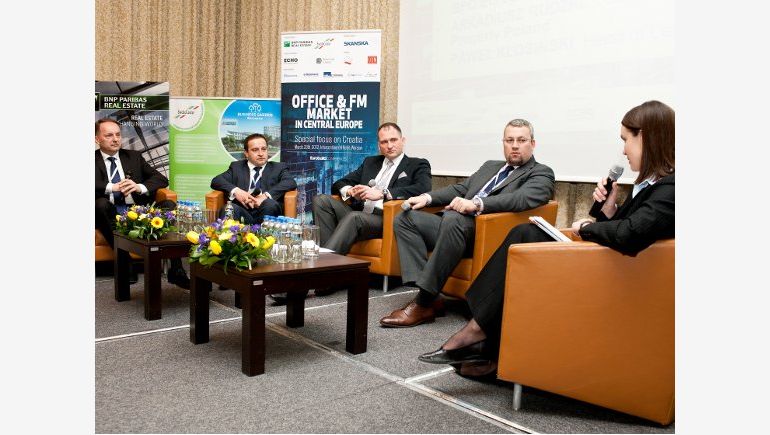In the event organised by Eurobuild Conferences participated representatives of leading consulting firms, investors, and developers from Poland, Hungary, and Croatia.
In discussion panels took part figures from international office market and facility management. Discussions and presentations given by particular speakers was preceded by an introduction by Anna Kot, Head of Office Agency and Tenant Representation Services in Jones Lang LaSalle, and Krystian Bestry, Vice President of the Board of the Association of Business Service Leaders (ABLS) and Managing Director of Infosys BPO Europe.
Anna Kot presented prospects for the office market in 2012, analysed demand and supply in Poland, promising localisations, the most important transactions of the previous moths (ING Group in Warsaw, Bank BPH in Gdańsk, Infosys in Łódź, and others), and rental rates. Krystian Bestry concluded that “business development is highly correlated with cost-cutting in Western Europe, even in the USA.” According to the Vice President of the Board of the Association of Business Service Leaders (ABLS), as the crisis deepens, more and more firms from the SCC/BPO sector come to Poland, thus our country became a leader in business sevices.
The first discussion panel at the conference, moderated by Anna Kot, was focused on the office market in times of crisis, including mature markets in Poland. Discussants tried to answer the following question: Which localisations have the widest prospects?
The next debate, moderated by Bartosz Soroczyński, Chairman of the International Facility Management (IMFA), was about facility management. Panelists considered what is the best solution for an owner: hiring a full-time property manager or placing an order at an external company? During the debate, the image of a relative young FM market emerged, which is still treated suspiciously by many companies.
Vedrana Likan, Managing Director of Colliers International for Croatia, Republic of Slovenia, and Bosnia and Herzegovina, led a discussion on the investment climate in Zagreb. The debate moderator distinguished four periods in the development of office market in Croatia, starting from 2001 to 2011, when, according to her, the Croatian office market entered into the second phase of development.
Bartek Włodarski, Landlord Representation Manager in Office Department at Cushman & Wakefield Poland, attempted to reach a consensus with the guests, analysing factors which argue for demolition, modernisation, and revilatisation of a building. During the conversation, the participants discussed the following issues: localisation, the possibility of increasing usable area, company’s prestige, connotations associated with a place, or the maintenance of an architectural detail during an object’s renovation.
Thomas Beyerle, Head of Corporate Sustainability & Research at IVG Immobilien AG, commented on firm analysis, a number of positive conclusions for Poland can be drawn from it. Dynamics is something that makes Warsaw stand out from other cities in East-Central Europe. Poland has been slightly affected by the euro-zone crisis - proportionally, we have one of the lowest public debts in the EU 27, among other countries only Sweden is in a more comfortable situation. After a strong recovery in 2011, the office market in Warsaw between 2012-2013 should remain balanced.
James Berry, Director of Office Agency in Jones Lang LaSalle in Hungary, told some interesting facts about the office market in Budapest. For example, in the capital of Hungary merely 28 buildings offer available space of over 5000 square meters, however only 15 of them are recognised as high standard buildings.
Agnieszka Jachowicz, Property Market Funds Managing Director in BZ WBK TFI SA, who performed detailed analysis of three old properties belonged to Arka BZ WBK Property Market Fund and Arka BZ WBK Property Market Fund 2. In each case different investment strategies were applied. Located in the very centre of Wrocław "Under the Blue Sun" Passage had to be renovated, Red Tower – the dominant part of Łódź – went through a major renovation, in turn Teofilów Business Park was decided to be demolished and rebuilt. During her speech, Agnieszka Jachowicz placed great emphasis on the profitability of investment and hidden costs.
The last discussion panel was moderated by Patryk Kruszewski, Chapter Lead Central Europe at CBRE FM. The speakers debated whether an investor is prone to recapitalise their investment and improve its standards, so that it can receive a highly honoured green certificate. They also tried to find some examples of office blocks which achieved this goal, and considered solutions for existing buildings to increase the efficiency of particular devices and adapt an office block to the requirements of sustainable construction.
After the Office and FM Market in Central Europe Conference one can come up with a wide range of conclusions. From the one hand, the office market in Warsaw has bright prospects in the coming year and Polish regional markets remain attractive to the BPO sector. From the other, outsourcing has its end, besides crisis in the euro-zone will not always enhance Polish investments.
